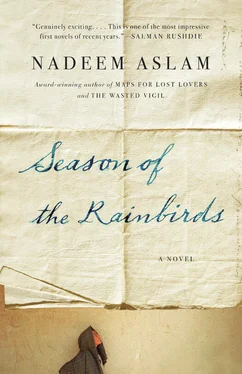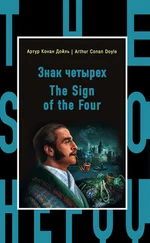Yusuf Rao stirred. ‘At our age you’re only getting out of bed to find another comfortable place to fall asleep in.’
The barber came round to the front and began to shape the greying hair on the forehead. Using the comb he smoothed the hairs into shallow curves before clipping the uneven tips.
At that moment, Maulana Hafeez tapped softly on the pane. The barber had looked up at the sound of footsteps advancing along the platform. Now his eyes shot towards the bench, where the radio was concealed.
After the greetings — the barber was reverent, Yusuf Rao restrained — the cleric went to sit on the bench.
‘Now,’ Maulana Hafeez said through a drawn-out sigh, ‘have you heard the news about the gates?’
The barber shook his head; Yusuf Rao loosened the wrap around his neck.
When Maulana Hafeez finished explaining the plan, Yusuf Rao threw his head back against the head-rest and laughed, clipped hair tumbling off his draped shoulders. The barber, sitting by the maulana’s side, looked disconsolately first at Yusuf Rao and then at Maulana Hafeez.
‘Forgive me, Maulana-ji,’ Yusuf Rao contained his laughter, ‘but that is the most absurd proposal I’ve ever heard.’ He tried not to look at Maulana Hafeez.
Maulana Hafeez hesitated before speaking. ‘But the town would be a safer place then.’
Yusuf Rao resisted the temptation to demur. The barber was nodding eagerly.
Maulana Hafeez went on: ‘It’s best to be prepared. This time eight days ago no one knew that Judge Anwar would be killed.’
Yusuf Rao sought Maulana Hafeez in the mirror. For a moment their eyes met, then both looked away. ‘In a way, Maulana-ji, I did,’ the lawyer said sourly. ‘He got what he deserved, had punishment meted out to him for all his crimes. Isn’t that what the Qur’an says about criminals, Maulana-ji?’
In a self-conscious effort to lighten the situation the barber said, ‘Maulana-ji, what would happen to the roaming herds of cows and water buffaloes when the gates go up?’
Maulana Hafeez did not reply.
‘There is a term in the English language that sums up this scheme beautifully, Maulana-ji,’ Yusuf Rao said. ‘Hare-brained. It means rash and foolish.’ And he roared with laughter once more.
Maulana Hafeez said, ‘This concerns everyone in the town. It’s a matter of your own safety too, Yusuf.’
‘I’ve already had one brush with death, Maulana-ji. It doesn’t bother me.’
Maulana Hafeez said in a low voice, ‘You’re being wilful simply because you still think that it was Mujeeb Ali who had you shot. But you must remember how strongly the Qur’an speaks out against defamation.’
Yusuf Rao examined the cleric — the white cap, the small bony face bearing the ravages of over seventy summers, the venerable white beard, the spotless white shirt smoothed meticulously with the palm of the hand before sitting down and beneath whose fabric the outline of a vest could be made out; an impassioned old man, the single-mindedness of whose passion had never ceased to surprise him. He spoke softly, ‘The world isn’t as simple as you are determined to see it, Maulana-ji. Not any more. You must recognise that some people have a heavy investment in causing hate.’
The reply was firm. ‘I cannot believe that. No matter how complicated the world becomes there is still only one absolute truth.’
Yusuf Rao too was shaking his head. He sighed and said, ‘Anyway, Maulana-ji, you can tell Mujeeb Ali that I’m not contributing even a teddy-paisa towards this scheme.’
He was not heard. There were loud voices outside the shop. The barber stood up slowly, reluctantly, and went to the door. The newspaper photographer was on the other side of the street, surrounded by a group of men and children. He appeared to be asking for instructions and it was clear that he was receiving contradictory or unsatisfactory answers. Maulana Hafeez approached the door. Only then did the barber see that one side of the photographer’s face and most of the upper part of his shirt were covered in blood.
Maulana Hafeez’s loud exclamation caused Yusuf Rao to come to the door as quickly as he was able. The photographer saw them come out of the shop and hurried across the street.
‘What happened?’ Yusuf Rao took off the cloth which was still wrapped around his body. With a nod of approval from the barber he offered it to the photographer. ‘Did you have a fall?’
The cut was high on the forehead, near the hairline. Drops of blood formed at the point of the injured man’s chin, two had fallen on to the camera slung around his neck. ‘Does this town have a doctor?’ he said testily.
Maulana Hafeez touched his elbow. ‘What happened?’
‘I went to photograph that goat. A woman hit me with an iron rod saying I was taking away the animal’s soul.’
Maulana Hafeez said quietly, ‘Islam forbids us to make images of God’s creatures. On the Last Day, God will challenge all artists to breathe life into what they created. Forced to admit failure, they will be consigned to the Fire.’
The injured man gasped in anger. ‘Maulana-sahib, you have been to Mecca, haven’t you? Well, then, didn’t you have a photograph taken for your passport?’
‘But that was not for vanity,’ said Maulana Hafeez, unperturbed. ‘And the first thing I did on getting back from the pilgrimage was to burn the passport.’ And with that he took the photographer’s elbow. ‘I’ll take you to Dr Sharif.’ He guided the man along the street. The photographer, holding the cloth to his forehead, let himself be led.
‘I had to see Azhar about something very important but that will have to wait now,’ said Maulana Hafeez.
Someone from the crowd shouted after him: ‘I have just seen his car drive away, Maulana-ji. So don’t trouble yourself today.’
Another voice rose, causing Maulana Hafeez to look back with a heavy heart. ‘You could always leave a message, Maulana-ji. Someone’s bound to be home.’
Yusuf Rao watched the cleric’s receding back. ‘I was wrong when I said Maulana Hafeez doesn’t understand the complexity of the world. I think he does. He just embraces the lesser of two evils when it suits him, and at other times absolutely refuses to compromise. It’s the other maulana, Maulana Dawood, the fanatic, who doesn’t realise that times have changed.’
‘But Maulana Dawood has been to Mecca as well,’ the barber said. ‘Five times.’
‘I wonder if he burns his passport every time he gets back.’
‘Maybe he knows he will be needing it again and keeps it.’
Back inside, the barber finished trimming Yusuf Rao’s hair. Then he smoothed shaving foam on to the lower half of Yusuf Rao’s face — Yusuf Rao gripped his lips between his teeth — and, after testing the razor on his callused palm, got ready to shave him. Yusuf Rao released his lips: they were neatly defined by the white foam.
‘I forgot to mention,’ the barber said. ‘On Saturday Kasmi-sahib and Maulana Hafeez nearly bumped into each other. Right here. Kasmi-sahib saw Maulana-ji but I don’t think that Maulana-ji saw him .’ He pushed his glasses up his nose with the back of his wrist, the razor pointing in the air. He moved Yusuf Rao’s chin upwards and began to shave the stretched skin under the jaw.
Yusuf Rao was unable to speak so the barber continued: ‘They burned his whole family. I often wonder what poor Kasmi-sahib felt having just heard the news about his village and then listening to the two maulana-jis rejoicing on their loudspeakers that the country was being purged.’
With a forefinger Yusuf Rao pushed the razor away from his face, slowly and evenly as though on a smooth rail. ‘Maulana Hafeez had nothing to do with that. He was in Mecca during those months. Remember? It was Maulana Dawood and the temporary maulana of this mosque who gave those sermons.’
Читать дальше












